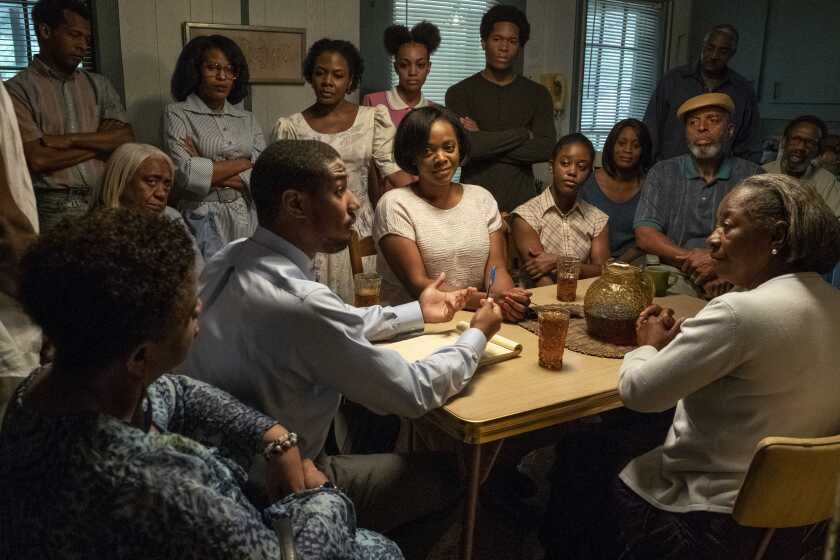When HBO was looking to cast a movie adaptation of Ray Bradbury’s classic novel “Fahrenheit 451" in 2017, talent agent Phillip Sun immediately thought of his client Michael B. Jordan.
People assumed the main character — a firefighter who burns books in an oppressive society in the future — was white. But Sun thought Jordan, a Black actor coming off the hugely successful movie “Creed,” would be perfect for the role.
“It’s a Ray Bradbury book that everyone knows was written white, but the themes of it, what it stood for, what it was speaking to society, is very of the times,” Sun said. “Why should it be a white person that’s leading that? Why couldn’t it be Michael?”
For years, Sun, a Chinese American, had guided the careers of prominent nonwhite Hollywood stars, including Jordan, at the powerful agency WME.
But in August, Sun branched out on his own and launched a management firm, M88, focused on inclusive storytelling and representing clients of color.
As Hollywood and other industries grapple with institutional racism, talent agencies and management firms face growing pressure to diversify their ranks and client base to better reflect the nation’s demographics. Despite strides in recent years, studios also have been criticized for not providing enough roles for people of color in front and behind the camera.
The box office success of 2018 movies led by a majority black ensemble of actors in the superhero movie “Black Panther” and ethnic Asians in the romantic comedy “Crazy Rich Asians” demonstrated that stories featuring people of color can bring massive global audiences to theaters. But many films fail to reflect the racial diversity of America. For example, a recent USC study showed just 3% of the top films from 2007 to 2018 led or co-led with Latino actors, even though Latinos represent nearly 19% of the nation’s population.
“The systems are just old and they need adapting to the new world order,” the 38-year-old Sun said. “It takes people who are willing to stand up and say, ‘This is how we’re doing things.’”
M88, based in Hollywood, manages more than 50 writers, actors, directors and producers. The “M” stands for its majority investor — L.A.-based production firm Macro — and the “88" references what is considered a lucky number in Chinese culture.
The company employs 10, nine of whom are people of color. And the majority of its more than 50 clients identify as nonwhite and include actors Idris Elba, Donald Glover and Gemma Chan.
“We’re trying to build a firm where everyone’s chasing culture, that we have culture as our heartbeat and then build from there,” Sun said.
Jordan is among M88’s most prominent clients, although the actor is also still represented by WME. (Like agents, managers help guide the careers of their clients but are prohibited under state law from procuring work for them).
Jordan is a household name now, but years ago, Sun was setting the stage for the actor to succeed. Jordan portrayed Johnny Storm in “Fantastic Four” in 2015. Some comic book fans criticized the movie’s director for casting Jordan in a role that was previously cast as white.
Although the film flopped at the box office, Sun had anticipated that risk. The agent said he had already lined up Jordan to appear as the hero in the commercially successful "Creed,” which came out a few months after “Fantastic Four.”
Sun said he doesn’t view Hollywood as inherently racist — just outdated. The system recognizes success and through that, people of color can advocate for necessary change, he said.
Sun was instrumental in establishing an agreement between Jordan and WarnerMedia, where the studio pledged to bring more women, people of color, LGBTQ and people with disabilities to work in front and behind the camera.
“Phil was a key architect in bringing the WarnerMedia Inclusion Policy to life,” Jordan said in a statement. “‘Just Mercy’ was the first film made under this new policy and the experience of being a producer with input on the entire process, from script to hiring — and as an actor physically working on the set — it was one of the proudest moments of my career.”

Michael B. Jordan in the drama “Just Mercy.”
(Jake Netter )
While he’s left WME on good terms, Sun said operating outside a large talent agency gives him more freedom to pursue his mission of inclusive storytelling and to provide more personal attention to clients.
“There’s no lean on me from any corporate politics,” Sun said, adding that at M88, he calls the shots. “You take your agenda with no kind of politics around it.”
M88’s largest investor is Macro, the L.A. production company founded by Charles D. King, a former WME partner and its first Black partner. King, a co-founder of M88, declined to disclose the size of his investment.
Sun would not provide any annual sale projections. He said M88 will make money through commissions or producing fees on projects its clients work on.
Clients may have opportunities to work with Macro’s production arm, similar to how WME’s clients can work with Endeavor Content. King said the businesses are kept separate to avoid any conflicts of interest with clients, an issue that has been raised by the Writers Guild of America in its battle with agencies over so-called affiliated productions.
“They (M88) have a fiduciary responsibility for the artists that they represent to make sure that they’re introducing them to all of the producers and studios in the entire ecosystem and to find the best partners for their clients’ material,” King said.
Macro has funded such critically acclaimed movies as “Fences” and “Mudbound.”
“I always felt like they got me at my core,” said actor Yahya Abdul-Mateen II, who is an M88 client. “They have a mission to do not only great work, but work that has cultural integrity.”

Yahya Abdul-Mateen II in “Watchmen”.
(Mark Hill / HBO)
To this day, Sun says his mom still wonders what his job is. His parents emigrated from Taiwan to the U.S. in the 1970s and moved to Milwaukee so his dad could get his PhD in physics.
His family later moved to Virginia when his dad worked as a scientist at NASA. After Sun graduated from William & Mary with a degree in international relations, he eventually planned to go to Washington, D.C., to explore a career in government. But Hollywood beckoned.
His brother co-financed a romantic comedy called “Adam & Steve” and Sun thought it would be fun to be an unpaid assistant on set. He quickly excelled — helped by memorizing actress Parker Posey’s coffee order for two days in a row — a feat that sparked other job opportunities and eventually landed him a position in the mailroom at the William Morris Agency.
In 2008, Sun became a talent agent right before William Morris and Endeavor merged to become WME. In 2015, he became the company’s first Asian American male partner.
“When you look at agents, we have one of the more difficult jobs in the business,” said Patrick Whitesell, executive chairman of Endeavor, WME’s parent company. “There’s multiple skill sets you need to have — you need to have a great eye, great taste, and an ability to negotiate and fight for your client. You need to be able to really architect a career. Phil’s proven to be able to do these things. It’s a demanding job but he excelled at it.”
Talent agencies are also stepping up efforts to diversify their workforce, by paying assistants more and giving them more opportunities to build skills that will help them rise up in the business.
None of the four major agencies have disclosed racial diversity data for their entire workforce. WME said it is in the process of collecting diversity data and will release it next year, as part of a #ChangeHollywood commitment in partnership with Jordan.
Sun believes representation businesses should release their diversity figures, even if their numbers are bad.
“Like, why hide? It makes it worse,” he said. “Address it and then have a plan of how to be better. That’s what we’re gonna encourage the marketplace.”
In the meantime, Sun hopes that representation businesses like M88 can help train a new, diverse, talented workforce.
“Where M88 can be a leader in the industry is to shine the light that a successful representation firm can look like us,” Sun said. “How do we keep pushing the bar for the next generation?”
"Hollywood" - Google News
October 02, 2020 at 07:00PM
https://ift.tt/3cS0e7m
Why one talent agent left WME to start his own diverse firm - Los Angeles Times
"Hollywood" - Google News
https://ift.tt/38iWBEK
Shoes Man Tutorial
Pos News Update
Meme Update
Korean Entertainment News
Japan News Update
Bagikan Berita Ini














0 Response to "Why one talent agent left WME to start his own diverse firm - Los Angeles Times"
Post a Comment